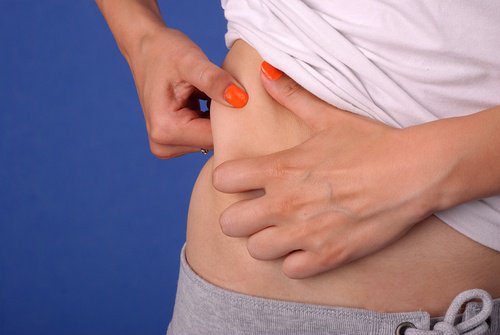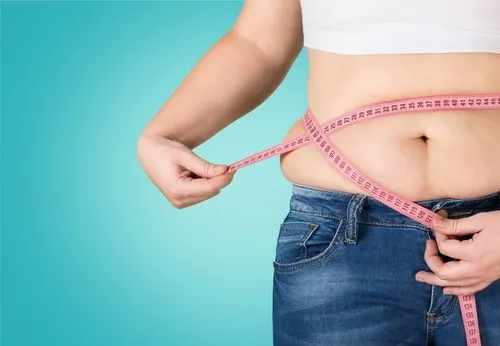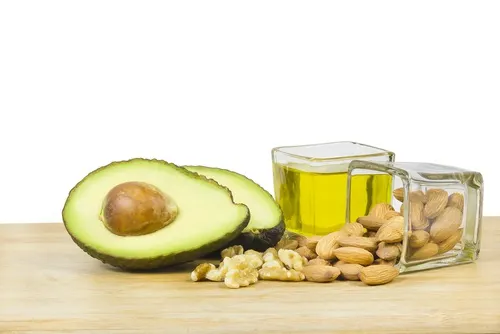What Causes Belly Fat and How Can You Fight it?

Many people have belly fat, some of who aren’t even overweight. Unfortunately, this type of fat can seem to be difficult to get rid of, even after trying various diets and using all kinds of treatment.
However, their efforts might be misdirected and the solution to getting rid of belly fat might not be so complicated after all.
In this article, you will find out what causes belly fat. We’re going to focus on the following causes: protein deficit, hormonal changes, lack of adequate exercise and bad posture.
See Also: 5 Protein Smoothies to Improve Your Workout
What causes belly fat?

When we talk about people being overweight, we understand that they have too much fat, or perhaps, water retention, in certain parts of their body. Some body parts that tend to store a lot of fat are the abdomen, thighs, arms, back, and glutes.
Also Read: 10 Best Fruits for Fighting Water Retention
However, one of the most common problems for middle-aged men and women is belly fat.
There are even otherwise thin people who have belly fat and struggle to get rid of it, despite easily losing fat in other parts of their bodies.
Below, you’ll discover why this could be the case.
An unbalanced diet

When we wonder why we have belly fat and how we can get rid of it, we often think that we should reduce our calorie intake.
However, the idea that we should eat better quality food, which is not processed, instead of cutting calories, is becoming more popular.
To follow a balanced diet that helps you to lose belly fat, you should:
- Add a portion of protein in each main meal, alternating between animal protein (preferably organic) and vegetable protein (legumes, nuts, avocado).
- Choose whole grains instead of refined grains.
- Eliminate white sugar from your diet and consume honey, sugar cane honey, whole sugar cane, etc.
- Stop eating processed and hydrogenated fats, present in fried foods, margarines, or confectionery item. Instead you should consume healthy fats, found in cold-pressed vegetable oils (olive, coconut, sesame and flaxseed oils, for instance), avocado, nuts, seeds, oily fish, butter, or ghee.
Living a sedentary lifestyle
Exercise is vital to maintaining a healthy weight. More importantly, it helps you to lose weight from your waist. This is because a lack of exercise causes us to fat, including belly fat.
The most appropriate exercises are high to medium-intensity exercises. It’s enough to do two or three half hour sessions a week of these exercises.
Hormonal changes
Hormonal changes also cause us to gain belly fat. This is especially the case for women going through perimenopause and menopause. However, young women who have high levels of estrogen, can also suffer from hormonal changes.
A balanced diet is also vital for regulating hormones. Supplements such as maca, chasteberry and yam also help in this area.
Furthermore, menopausal women can also benefit from taking evening primrose oil.
Fortunately, some hormonal disorders also disappear overtime, because the body readjusts naturally.
Bad posture
When none of the factors above seem to be related to your case, you should also consider whether your belly fat could be related to bad posture.
Many people suffer from spinal deformations, such as lordosis or escoliosis, also have excess fat on the sides of their body. Therefore, obesity may be linked to bad posture.
All cited sources were thoroughly reviewed by our team to ensure their quality, reliability, currency, and validity. The bibliography of this article was considered reliable and of academic or scientific accuracy.
- Dennehy, C. E. (2006). The Use of Herbs and Dietary Supplements in Gynecology:An Evidence-Based Review. Journal of Midwifery and Women’s Health. https://doi.org/10.1016/j.jmwh.2006.01.004
- Bayles, B., & Usatine, R. (2009). Evening primrose oil. American Family Physician. https://doi.org/10.1136/bmj.309.6966.1437a
- Trobisch, P., Suess, O., & Schwab, F. (2010). Idiopathic scoliosis. Deutsches Ärzteblatt International. https://doi.org/10.3238/arztebl.2010.0875
- Bischoff, S. C., & Feuser, K. (2012). Food Allergy and Intolerance. In Textbook of Clinical Gastroenterology and Hepatology: Second Edition. https://doi.org/10.1002/9781118321386.ch38
This text is provided for informational purposes only and does not replace consultation with a professional. If in doubt, consult your specialist.








